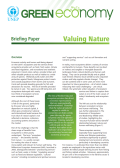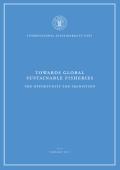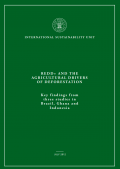
At a more fundamental level, healthy ecosystems represent the foundation of economic activity and a prerequisite for achieving a green economic transition. Given this, it is essential that the economic value of these services are recognized, demonstrated and captured in the accounts and decision-making of governments, the private sector and consumers
This publication summarises the proceedings of a conference organised during April 2012 in Lisbon by the think tank Platform for Sustainable Growth (Plataforma para o Crescimento Sustentável) on the topic “How can we foster green growth?” Speakers included António Costa e Silva (CEO of Partex), Joy Kim (Advisor at United Nations Environmental Programme), Peter Vis (Chief of Cabinet of the EU Commissioner on Climate Action) and Carlos Pimenta (Coordinator of Sustainability at PCS). The aim of the event and the follow-up publication was to identify the role green economy can play to achieve sustainable growth in Europe in general and Portugal in particular.
This paper explores the high dependency of a number of countries of the Southern African Development Community (SADC) on mineral resources, and the relative lack of expected social benefits from the extractive industries sector in these countries. The brief finds opportunities for greener and inclusive growth by linking extractive industries to other development goals beyond economic returns, as well as by integrating environmental concerns more broadly into economic development plans.
“Green growth” is an attractive slogan with a variety of possible meanings. This essay critically examines several potential meanings of this slogan and provides a brief overview of some of the main implications of the other papers in this special issue. Taken together, these papers argue for the importance of careful analysis of energy/environmental policies, particularly ambitious ones claiming to offer huge benefits with little or no cost.
This article appeared in the Energy Economics Supplemental Issue: Green Perspectives.
Although gender considerations are relatively new in the climate change discourse, it is hardly surprising that they have been at the heart of recent activism and policy advocacy efforts by multiple actors. Socio-economic research and evaluations of development effectiveness both confirm that access to resources and the agency to use them are influenced by gender roles, responsibilities and differential access to opportunities and influence
The findings of this research reveal the key role of informal and formal institutions in the local responses to climate change and, correlatively, the need for institutional strengthening as well as innovation in the existing ‘traditional’ coping strategies for climate shocks and hazards. The research findings also highlight the importance of gender inequalities as major social barriers to the development of adequate adaptation strategies by and for women.
Fossil fuel subsidies undermine efforts to mitigate climate change and damage the trading system. However, multilateral discussion is hampered by inconsistent definitions and incomplete data. Members do not notify such subsidies as much as they should under the Agreement on Subsidies and Countervailing measures (ASCM), which limits the usefulness of the SCM Committee. The reports of the Trade Policy review mechanism on individual countries and on the trading system draw on a wider range of sources, creating an opportunity for non-governmental organizations (NGOs) to provide the missing data from publicly available sources. This report suggest a new template that could be used for such third-party notifications. The objective is to shine a light on all fossil fuel subsidies that cause market distortions, especially trade distortions. The result should be better, more comparable data for the Secretariat, governments, and researchers, providing the basis for better-informed discussion of the incidence of fossil fuel subsidies and rationale for their use.
The Agriculture Programme has undertaken research on the sustainability and resilience of food systems at a global level. “What price resilience?” sets out that the resilience that is required within food production systems to cope with increasingly severe and frequent shocks is also a prerequisite for economic, social and political security.
“What price resilience?” highlights the need to develop a comprehensive understanding of the true costs of agriculture once ‘externalities’ associated with pollution, water depletion, soil degradation, biodiversity loss and greenhouse gases have been taken into account. The results of an economic analysis of the costs and benefits of eight conventional food production systems and sustainable alternatives are presented

This report presents the analysis and findings of the ISU’s research and consultative work in seeking to understand what is necessary to achieve more sustainable fisheries worldwide. The report sets out case studies and thematic analysis in order to provide context for the work of the ISU Marine Programme. It also sets out the economic, social and environmental case for change.
The world is at a juncture where future financing for forests and REDD+ seems uncertain, and there is a clear risk of a narrative of disappointment setting in. These pressures demand a redoubling of international efforts.
In light of the new challenges and the lessons learned, this paper suggests several pathways to be considered for the next phase of financing of efforts to protect forests, and to enable forest countries to adopt alternative development pathways in which deforestation is reduced. These pathways include the need to:

In order to ensure global food security and avert dangerous climate change, the world faces the pressing dual challenge of both protecting its remaining rainforests and enhancing food production in sustainable and resilient ways. Successfully achieving this would provide multiple co-benefits, including safeguarding the well-being and livelihoods of forests peoples; protecting the biodiversity and ecosystems provided by forests; and reducing rural poverty.
